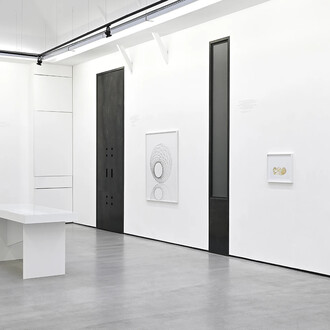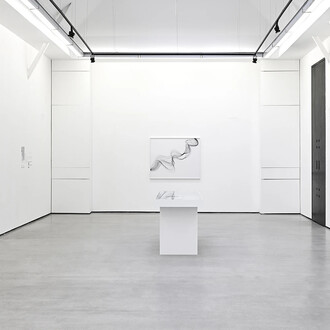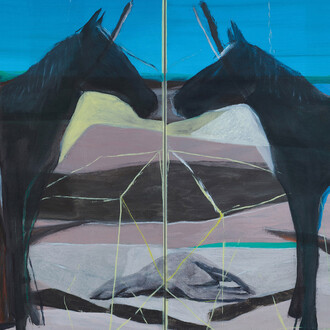Esther Schipper is pleased to present Jarred kitchen, Karolina Jabłońska’s second solo exhibition with the gallery and her first at our Paris space. On view are sixteen newly commissioned oil paintings executed on canvas and wood. The presentation is accompanied by an essay by the curator and researcher Mėta Valiušaitytė; the following is an excerpt from her comprehensive text, available at the gallery and linked below.
In Jarred kitchen, Karolina Jabłońska stages encounters with food preparation: cutting, storing, displaying. Her new series explores the paradoxes of preservation, turning the kitchen into a stage where humor, memory, and the female body and labor converge. The large canvases submerge the viewer: monumental female heads, painted on two-meter supports, draw one into a world of giantesses. When their eyes are not closed, their gazes are watchful, yet distant, as if estranged from their domestic surroundings. The smaller works lead viewers into the intimacy of a pantry. Glass jars are filled with pickled cucumbers, beetroots, and red berries–but amid them float fragments of human bodies.
Jabłońska’s dark humor turns domestic scenes into sites of tension and estrangement. The motif of the head recurs throughout her work. Modeled on her own features, it is a face she once learned to draw quickly and now reintroduces as needed, almost as a ready-made image. In The Egg Maker, a pale face fills the whole surface, but is unexpectedly muzzled by a hand resting beneath its softly curved nose. This palm is also a nest and carries three eggs. As the artist notes, the painting evokes the sensation of a “lump in the throat,” a moment of tension between release and containment.
While the paintings featuring the artist’s alter-ego are executed on large linen canvases, the smaller works are painted on wooden panels. Measuring barely twenty by fifteen centimeters, they are only slightly larger than a human hand. Jabłońska began working on small wooden supports when she was first searching for a way to archive motifs from her larger paintings. Acquiring panels originally used for icon painting and priming and polishing them meticulously herself, she found pleasure in the slow, devotional process. Some of her panels present a jar placed on a wooden surface, rendered with the stillness of a Cézanne-like portrait of things. The act of preserving summer abundance for winter survival has deep roots in Polish domestic culture. In Jabłońska’s works, these jars, known in Poland as słoiki, become not only containers of food, but also transparent vessels of memory: memories of survival in uncertain times, of foresight, and of invisible female labor. Jabłońska’s paintings transform those memories into allegory, where the kitchen becomes a theater of awkward gestures. The exhibition is a pantry of personal mythology, where humor and horror coexist.












